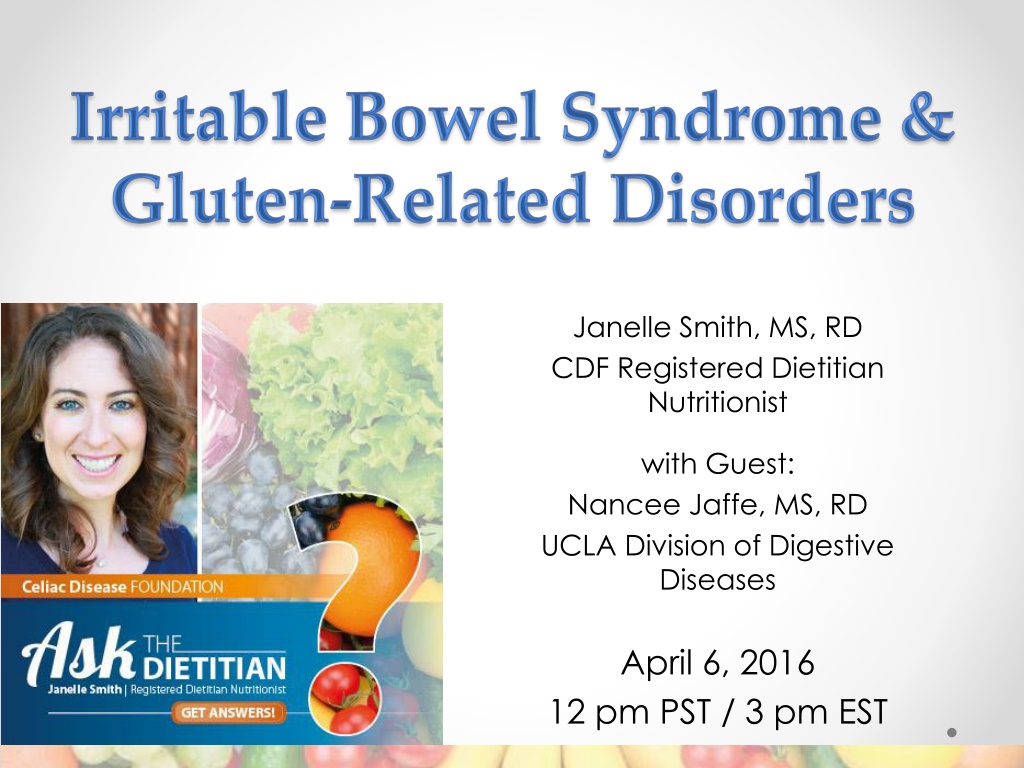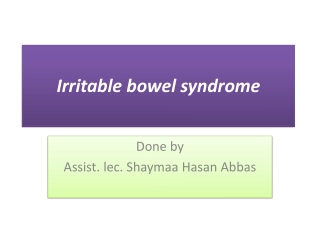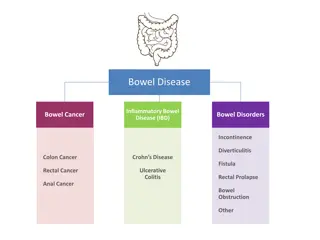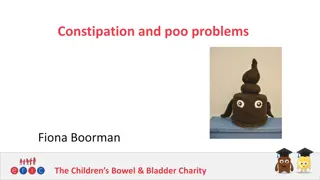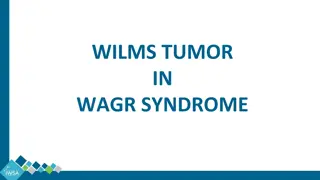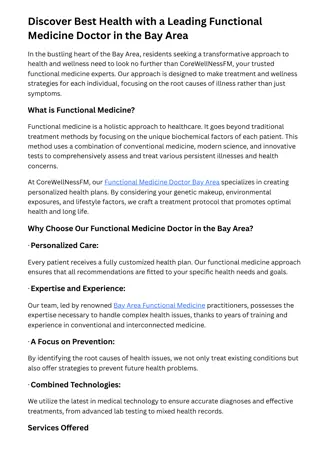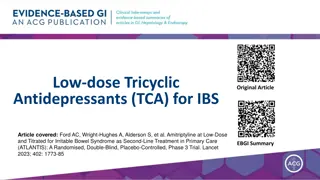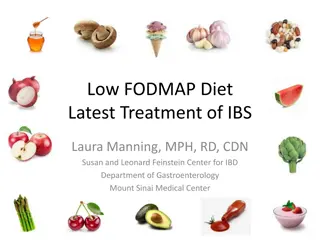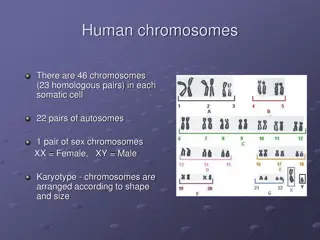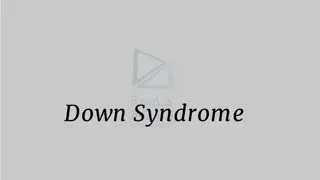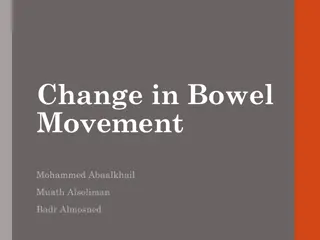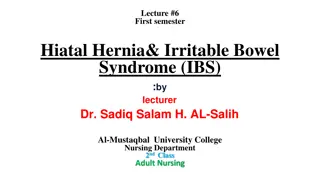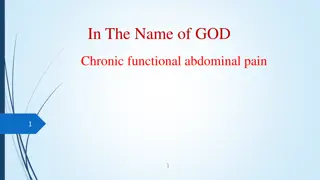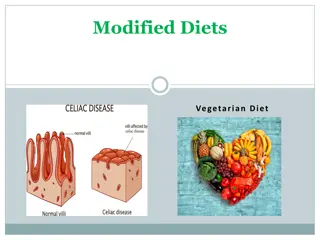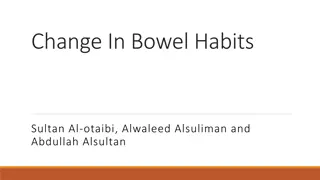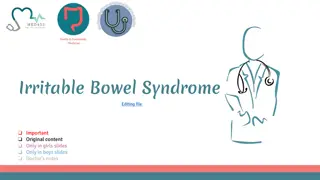Understanding Irritable Bowel Syndrome (IBS), FODMAPs, and Gluten-Related Disorders
This webinar discusses the relationships between Irritable Bowel Syndrome (IBS), FODMAPs, and gluten-related disorders, covering topics such as the definition of IBS, its relationship with Celiac Disease and Gluten Sensitivity, the Low FODMAP diet, and functional gut disorders. Functional GI symptoms and the types of IBS are also elaborated, providing valuable insights into managing these conditions effectively.
Uploaded on Sep 30, 2024 | 0 Views
Download Presentation

Please find below an Image/Link to download the presentation.
The content on the website is provided AS IS for your information and personal use only. It may not be sold, licensed, or shared on other websites without obtaining consent from the author. Download presentation by click this link. If you encounter any issues during the download, it is possible that the publisher has removed the file from their server.
E N D
Presentation Transcript
Janelle Smith, MS, RD CDF Registered Dietitian Nutritionist with Guest: Nancee Jaffe, MS, RD UCLA Division of Digestive Diseases April 6, 2016 12 pm PST / 3 pm EST
Todays Webinar The relationships between IBS, FODMAPs, and gluten- related disorders 1. What is irritable bowel syndrome (IBS)? 2. IBS and Celiac Disease 3. IBS and Gluten Sensitivity 4. Gluten or FODMAPs? 5. The Low FODMAP diet
Guest Speaker Nancee Jaffe, MS, RD UCLA Division of Digestive Diseases UCLA Celiac Disease Program
Functional Gut Disorders What does functional mean? Disorder where the body's normal activities are impaired Movement of the intestines Sensitivity of the nerves of the intestines Way in which the brain controls some of these functions There are NO structural abnormalities that can be seen by endoscopy, x-ray, or blood tests Identified by the characteristics of the symptoms
Functional GI Symptoms Functional Disease States Functional heartburn Functional dyspepsia (indigestion) Functional vomiting Functional abdominal pain Functional constipation Functional diarrhea Functional dysphagia (trouble swallowing) Aerophagia (swallowing excess air) Irritable bowel syndrome acid reflux/ heartburn abdominal cramping vomiting nausea abdominal pain constipation diarrhea bloating changes in motility (movement of digestive organs) gas / excess flatus (passing gas)
Irritable Bowel Syndrome Definition: Recurrent abdominal pain or discomfort** at least 3 days/month in the last 3 months associated with two or more of the following: o Improvement with defecation o Onset associated with a change in frequency of stool o Onset associated with a change in form (appearance) of stool * Criterion fulfilled for the last months with symptom onset at least 6 months prior to diagnosis ** Discomfort means an uncomfortable sensation not described as pain.
Irritable Bowel Syndrome (IBS) Types 1. IBS-Diarrhea predominant o Abdominal pain accompanied by diarrhea 2. IBS-Constipation predominant o Abdominal pain accompanied by constipation 3. IBS-Mixed o Abdominal pain accompanied by alternating episodes of both constipation and diarrhea May include abdominal bloating, cramping, gas, and distention
Irritable Bowel Syndrome (IBS) Affects 25-45 million people in US 10-20% of population About 2 in 3 IBS sufferers are female Approx. 20-40% of all visits to gastroenterologists are for IBS symptoms IBS is unpredictable symptoms vary and are sometimes contradictory IBS can only be diagnosed by a medical professional
Irritable Bowel Syndrome (IBS) Causes: The exact cause of IBS is not known Disturbance in the way the gut, brain, and nervous system interacts Causes changes to bowel movements and sensations Stress does not cause IBS stress can worsen or trigger symptoms Impact of IBS includes: Physical wellbeing Emotional wellbeing Economic wellbeing Educational wellbeing Social wellbeing
IBS and Celiac Disease (CD) Prevalence of CD in IBS patients 3-4% Prevalence of IBS in biopsy-proven CD up to 20% Celiac disease patients: o Some celiac patients continue to have gastrointestinal symptoms despite strict adherence to a gluten-free diet (i.e. functional symptoms) o Rule out hidden gluten first and other causes of non- responsive CD o If clinically in remission (negative biopsy and bloodwork) with continued symptoms consider IBS or other functional issue
IBS and Gluten Sensitivity (NCGS) Non-celiac gluten sensitivity Those without celiac disease or wheat allergy but with gastrointestinal symptoms that improve when gluten is removed from the diet Unknown mechanism No damage caused to the intestine Roughly 0.6 6% of US population (up to 18 million affected) Gluten or wheat sensitivity occurs in 28-30% of patients with IBS
Diet for Irritable Bowel Syndrome 2008 NICE Dietary Guidelines: Have regular meals and take time to eat Avoid missing meals or leaving long gaps between eating Drink at least 8 cups fluid per day Restrict tea and coffee to 3 cups per day Reduce intake of alcohol and fizzy drinks It may be helpful to limit intake of high-fiber foods Limit fresh fruit to 3 portions per day People with diarrhea should avoid sorbitol People with wind/bloating eat oats and linseeds
Beyond NICE - Diet for IBS Low FODMAP Diet Acronym for specific short-chain sugars that ferment in the gut and contribute to GI symptoms F Fermentable O Oligosaccharides (fructans and galactans) D Disaccharides (lactose) M Monosaccharides (excess fructose) A And P Polyols (sorbitol, mannitol, maltitol, xylitol, isomalt)
Low FODMAP Diet Low FODMAP Diet reduces: o bowel distention o abdominal pain o colonic fermentation / gas production o abdominal bloating o flatus (passing gas) o small intestinal fluid volume o diarrhea, loose stool
Patsy Catsos. FODMAPs Practice Kit for RDNs. May 2014.
http://blog.katescarlata.com/fodmaps-basics/fodmaps-checklist/http://blog.katescarlata.com/fodmaps-basics/fodmaps-checklist/
Low FODMAP Diet Protocol Elimination Diet 2-8 weeks total NOT long-term diet! Reintroduction phase complete with SKILLED dietitian Gluten-free does not mean Low FODMAP! Label reading very important
FODMAPs vs. Gluten Which is causing symptoms? FODMAPS include Fructans o Fructans potentially problematic sugar found in wheat, barley and rye, and to smaller degree in oats (>1/2 cup serving) Gluten-containing foods include Fructans o Gluten potentially problematic protein found in wheat, barley and rye, and to smaller degree in oats through cross-contact
FODMAPs vs. Gluten Research is contradictory and still evolving NCGS patients improve on gluten-free diet NCGS patients do better when FODMAPs removed, but worsen when wheat/gluten is reintroduced For some people with gluten sensitivity and IBS, reducing FODMAPs alleviated symptoms better than a gluten-free diet alone One study showed no additional benefit of gluten-free diet compared to low FODMAP + gluten-free diet, and actually showed decreased compliance when GFD added
A Day on Low FODMAP Diet from KateScarlata.com Breakfast: cup cooked oatmeal topped with cup strawberries + blueberries, 1 tbsp chopped walnuts Lunch: Rice Bowl scoop of brown rice, layered next with chopped Boston lettuce, cherry tomatoes, and scallion (green part only); top with grilled chicken or shrimp, grated cheddar. Add fresh lemon juice and olive oil drizzle for dressing Dinner: Grilled cheddar, ham and tomato sandwich (ex. low FODMAP friendly bread: Udi s white), with a side of kale salad (1 cup finely chopped kale, 5 cherry tomatoes, 1 tbsp pumpkin seeds, olive oil and lemon drizzle). OR Lean piece of grilled steak, Bibb lettuce salad with grated carrots, cherry tomatoes, and orange pepper slices with red wine vinegar and olive oil dressing and roasted dill potatoes (no garlic)
Resources CDF Spring 2016 Insight - recipes Kate Scarlata website and blog: blog.katescalata.com Sue Shepherd FODMAP website: shepherdworks.com.au Patsy Catsos website and books: IBSfree.net Monash University Low FODMAP Diet App International Foundation for Functional Gastrointestinal Disorders: IFFGD.org Nicerfoods.com Low FODMAP product store
Research The relation between celiac disease, nonceliac gluten sensitivity and irritable bowel syndrome; Magdy El- Salhy1,2,3*, Jan Gunnar Hatlebakk2,3, Odd Helge Gilja2,3,4 and Trygve Hausken2,3,4 The Low FODMAP Diet for Treatment of Irritable Bowel Syndrome and Other Gastrointestinal Disorders; Muir and Gibson - advances in nutrition; Gastroenterology & Hepatology Volume 9, Issue 7 July 2013 No Effects of Gluten in Patients With Self-Reported Non- Celiac Gluten Sensitivity After Dietary Reduction of Fermentable, Poorly Absorbed, Short-Chain Carbohydrates; Jessica R. Biesiekierski,simone L. Peters,evan D. Newnham,ourania Rosella,jane G. Muir,peter R. Gibson; Gastroenterology, 2013
Celiac.org/Webinars Celiac.org/Ask
